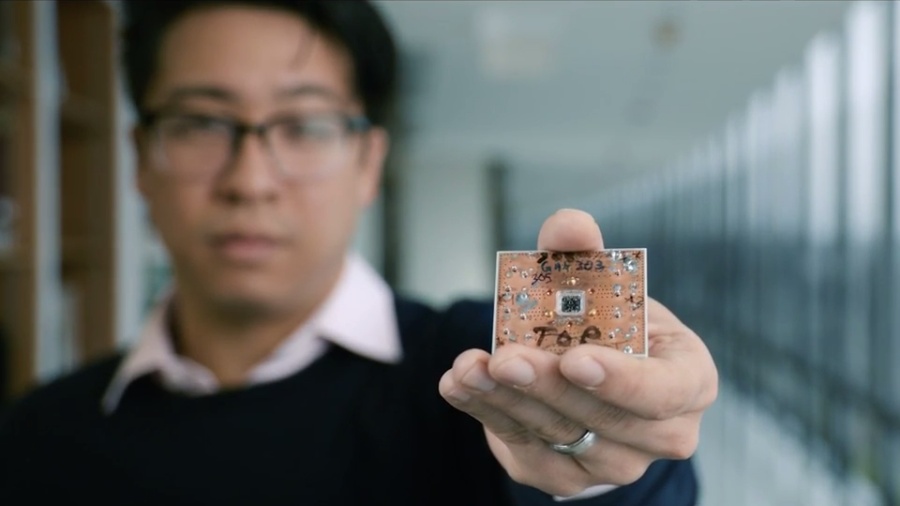
WHY THIS MATTERS IN BRIEF
Quantum computers are hailed as the next evolution of computing that promise immense performance increases over today’s systems and by 2020 they may be ready for prime time.
Having laid the groundwork for offerings in other emerging technology categories such as artificial intelligence (AI), with its IBM Watson platform, and blockchain, via the Hyperledger consortium, IBM now also sees quantum computers as its next big, although nascent, business opportunity… and, off topic, am I the only one who finds it funny that a computer scientist who’s helping to develop one of the most powerful computing platforms known to man has to write the word “top” on his computer chip?
Anyway…
“IBM has invested over decades to growing the field of quantum computing and we are committed to expanding access to quantum systems and their powerful capabilities for the science and business communities,” said Arvind Krishna, senior vice president of Hybrid Cloud and director for IBM Research, “following Watson and blockchain, we believe that quantum computing will provide the next powerful set of services delivered via the IBM Cloud platform, and promises to be the next major technology that has the potential to drive a new era of innovation across industries.”
Unlike traditional computers, quantum computers, which could one day be superseded by DNA computing platforms, are designed to harness the stranger properties of physics to perform far more complicated operations, at a much, much faster rate than even today’s fastest supercomputers but they’re still an emerging technology, and the first “true” head to head quantum computing bake off, between IBM’s machine and one from the University of Maryland, only took place a few weeks ago.
Whereas a conventional computer stores information as “bits” in one of two states, where 1 equals “On” and 0 equals “Off,” a quantum computer uses “Qubits” to hold multiple states at the same time, thus unleashing the weird “superposition” property of quantum mechanics to create a computing system that’s capable of exponential power.
Since IBM opened up access to it’s IBM Quantum Experience, via the internet, to its own fledgling 5-qubit processor quantum computing system, dubbed IBM Q, to the public last May, over 40,000 people have run more than 275,000 experiments on it, and IBM sees the level of engagement by outsiders as encouraging.
In order to get even more people on board though this week IBM released a new Application Programming Interface (API) for the system that lets developers build new software integrations between classical computers – like the one you’re using to read this story – and IBM’s existing quantum computing system, which resides at a research lab in Yorktown Heights, New York.
IBM’s also releasing a quantum computing simulator that can model a 20-qubit system and in the coming months it plans to push out a full software development package that programmers can toy around with. But all of this is just the beginning. IBM’s also announced it has plans to make “universal” quantum computing commercially available “within the next few years.”
“We see a direct path to the 50-qubit range,” says Scott Crowder, Vice President and CTO of IBM’s quantum computing division, eyeing a target that would give the quantum system an edge over classical ones for certain computational problems, “and within the next few years, hopefully by 2020, we’ll make it commercially available for the cloud for people to use.”
Although IBM declined to specify an exact time frame for commercial availability, which is contingent on researchers overcoming many engineering obstacles, the company is looking to encourage prospective customers to think about how they could leverage quantum computing to benefit their business.
Right now, IBM hopes to persuade programmers and organisations, such as the UK’s Royal Bank of Scotland who recently invested money in 1QBit, a quantum computing algorithm company, to start experimenting with the tech so they might one day use it to make breakthroughs in chemistry, finance, medicine, transportation and other industries. IBM is betting that quantum computing will grow increasingly important as Moore’s Law – a rule that governed the advancement of semiconductors and computational power over the past decades, and which was recently abandoned by the big fab and chip companies such as Intel, Samsung and TMSC, begins to reach its theoretical limits. But as one law appears to fade, another law, quantum computing’s own Moore’s Law substitute – the so called Rose’s Law could take over.
Unlike D-Wave, a Canadian company who’ve developed a quantum computing platform that’s used by the likes of Google and NASA, which can only be used to model very specific applications, IBM wants to create a “Universal” quantum computer – something of a holy grail in quantum computing terms – that can flexibly model anything people can dream up.
“At the moment we find ourselves in something like the early ’40s or ’50s of computing,” says Dario Gil, vice president of science and solutions at IBM Research, referring to the era that spawned the modern computer, “at that time no one foresaw the possibilities of how computers would evolve.”
IBM is not alone in the effort. The company has six partners in its IBM Research Frontiers Institute that are collaborating on quantum hardware and software design, including Canon, Honda, Hitachi Metals, JSR, Nagase and Samsung.
Bob Sorensen, an analyst at the research firm IDC, says that while the technology holds great promise, it will not be ready for primetime for a number of a good number of years – and it must be demonstrated to improve upon the computers we have today.
“By offering a series of announcements, IBM is tapping people on the shoulder saying, ‘We’re committed to this’,” he says, “it’s an incremental process.”
















